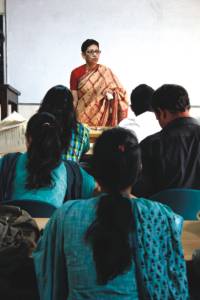Campus Edibles

Saad Adnan Khan
 |
|
Teachers should ask students for opnions. Photos: Kazi Tahsin Agaz Apurbo |
|
As young adults, we university students want to be inspired by our teachers. We listen and talk to them, because this is the transitional phase where we learn how to transform our words and thoughts into action and practice. University teachers are supposed to enlighten us and basically help us rediscover whatever we have been taught in school and figure out what life is all about. However, sometimes teachers can be disappointing in terms of their teaching technique, attitude towards students and personality.
It is infuriating when teachers are not creative in class rooms. The last thing we university students want is to be treated like students of primary level. When teachers ask us to memorise from books, how can we not be dumbfounded at the sheer insult that the teacher directs at our intellectual integrity? Memorising is not only obsolete, but it is also useless, and how long will it take teachers to understand that? We expect teachers to delve into enthusiastic and interesting conversations with us, so that the lessons stay with us even when we step outside classrooms. The most mundane thing a teacher can do is summarise what is written in books, and then ask students to go home, read it and memorise for the exam.
“A lot of students at my college do not attend lectures because of uninteresting teachers. These students do private tuitions with some other teacher, who is good at teaching, from the same college. How can students feel motivated when they have teachers who make silly grammatical and pronunciation mistakes?” says Humaira Kadir Bonna, an English major from Eden Mahilla College.
University students are intelligent enough to distinguish a bad teacher from a good one. We get frustrated too, with teachers who are boring. Administrative boards take teachers who ace in their studies, but just good grades have nothing to do with being a good teacher. To be a good teacher, one needs several other qualities, such as enthusiasm, patience, charisma, dedication, sense of humour and a nice, friendly disposition, so that students can approach them. Often times students who graduate from university with a Master's degree from a renowned national public or North American or European university, are given instant jobs just because their resumes look nice with credentials.
| |
 |
| |
Teachers should use multimedia and interesting materials in classroom. |
Students go to university to explore their intellectual niche, and that can only happen once students start talking. Sometimes lecturers get so carried away with their own notes that they forget to ask students about their opinions and thoughts. Teaching in university class rooms should be a two-way deal, and teachers should push students to talk and challenge. Students take time to come out of their comfort zone, for which it should be the duty of teachers to break the ice and pull students out of their comfort zones, so that they become braver and more confident individuals. “A good teacher is a good communicator. A teacher who has a first class degree does not necessarily mean that s/he will be a good teacher. I do not give lectures in traditional ways, but I go and talk to my students, to make classes interactive. I warm up by asking casual questions and doing a little revision at the beginning of class. I use multimedia and show documentaries. Learning should be made fun. If I'm teaching film history, I will focus less on dates and more on society and cultures and their significance and influence on cinema”, says Nandita Tabassum, Lecturer at Stamford University. She teaches Visual Media courses.
Sharmin Rahmatulla is a Graduate student in English Language Teaching (ELT) at East West University and Teaching Assistant in Centre of Languages at BRAC University. She says, “Being a student is an advantage for me to understand my own students. To me the unappealing qualities of some of my teachers stand out, and I make sure that I do not have them when I teach. As a student I may make silly remarks or ask silly questions, but it is the job of a teacher to not judge and never make their students feel embarrassed, for which I keep an open mind in class. I encourage my students to talk and I accept opinions in a healthy way”.
Teachers should have passion for teaching. Teaching is such a beautiful job, because it is one of those very few jobs that can bring changes. Teachers need to understand that they have the platform to spread information and enlighten, and they should do so with sincerity, dedication and creativity.
DID YOU KNOW?
Anoushka Shankar
 |
|
British Indian sitar player and composer, Anoushka Shankar was born on 9 June 1981 to the legendary Sitar Player Ravi Shankar and Sukanya Shankar. Through her father, she is the half-sister of Norah Jones. As a teenager, she lived in Encinitas, California and attended San Dieguito Academy. A 1999 Honors graduate, Shankar decided to pursue a career in music rather than attend college. She is deeply rooted in Indian classical music, having studied exclusively with her father from the age of nine. Twice-nominated at the Grammy Award, Anoushka was the first Indian musician to perform at the Grammy Awards in 2006 when she was nominated for Rise, soon after becoming the youngest-ever nominee and the first woman nominated in the World Music category, for her album Live at Carnegie Hall in 2002. She was also chosen as one of 20 Asian Heroes by the Asia edition of Time magazine in 2004, and was the youngest and first female recipient of a House of Commons Shield from the British House of Parliament in 1999. She made her performance debut in 1995 in New Delhi at the age of thirteen, and was playing venues such as Carnegie Hall by the age of fifteen. At sixteen she signed an exclusive recording contract with Angel/EMI and released three classical recordings: Anoushka (1998), Anourag (2000) and Live at Carnegie Hall (2001), all to great critical acclaim. After finishing her schooling, Anoushka put all of her focus into following her musical pursuits and began touring in earnest, developing a solo career as a classical sitar player, while also continuing to accompany her father.
Information source: Internet
|
|
|
